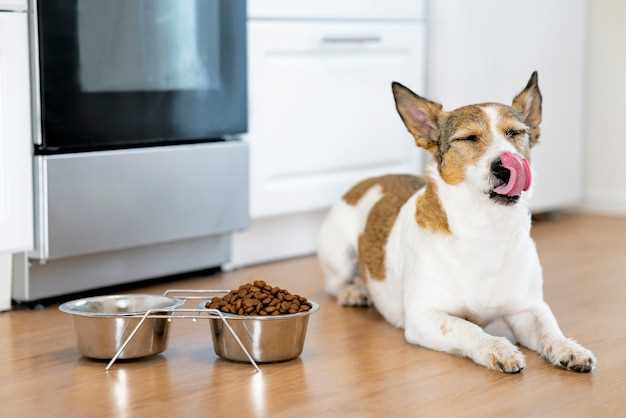
</p>
German Shepherd puppies require a specialized diet to support their rapid growth and development. Puppy food is formulated with the essential nutrients and higher calorie content that growing puppies need. However, as your German Shepherd puppy matures, their nutritional needs will change.
Typically, German Shepherd puppies can transition to adult dog food between 12 and 18 months of age. This timing may vary depending on the individual dog and their specific dietary requirements. It’s important to monitor your puppy’s growth and consult with your veterinarian for guidance on when to make the switch.
One indicator that your German Shepherd puppy is ready for adult food is when they reach their full adult size. Most German Shepherds reach full physical maturity by around 2 years of age. At this point, their growth plates have closed, and their body is no longer actively growing. Switching to adult dog food can help prevent them from becoming overweight or developing skeletal issues.
When transitioning to adult food, it’s important to do so gradually to avoid digestive upset. Start by mixing a small amount of adult food into their puppy food and gradually increase the ratio over the course of several weeks. This will allow your German Shepherd puppy’s stomach to adjust to the new food and minimize the risk of gastrointestinal issues.
Remember, every dog is unique, and their nutritional needs may vary. It’s best to consult with your veterinarian to ensure that you are providing the appropriate diet for your German Shepherd puppy at each stage of their life.
Growth Milestones
As your German Shepherd puppy grows, they will go through various growth milestones that indicate their development and readiness for transition to adult dog food. These milestones can vary slightly depending on the individual puppy, but typically occur around the following ages:
- 3-4 weeks: The puppy begins to open their eyes and ears, and starts to show interest in solid foods. This is a good time to introduce them to puppy food.
- 6-8 weeks: The puppy is weaned from their mother’s milk and is eating solid puppy food exclusively. They should be gaining weight and growing steadily.
- 12-16 weeks: The puppy’s adult teeth start to come in, and they may experience some discomfort while teething. They should be maintaining a healthy appetite and growing at a steady rate.
- 4-6 months: The puppy’s adult teeth are fully grown in, and they have reached about 50-75% of their adult weight. They may start to show signs of adolescence and may need increased exercise and mental stimulation.
- 6-12 months: The puppy is now considered a young adult. They have reached most of their adult height and weight, and their growth rate slows down significantly. This is a good time to transition them to adult dog food.
While these milestones can serve as general guidelines, it’s important to remember that every puppy is unique and may develop at their own pace. Consult with your veterinarian to determine the best time to transition your German Shepherd puppy to adult dog food based on their individual growth and nutritional needs.
Diet Transition
When it’s time to transition your German Shepherd puppy to adult food, it’s important to do so gradually. Abruptly changing their diet can cause digestive upset and discomfort for your pup.
Start by mixing a small amount of the new adult food with their current puppy food. Gradually increase the ratio of adult food to puppy food over a period of about a week. This will give your puppy’s digestive system time to adjust to the new food.
Monitor your puppy during the transition period for any signs of digestive upset, such as diarrhea or vomiting. If you notice any of these symptoms, slow down the transition process and give your puppy’s stomach more time to adapt.
It’s important to follow the feeding guidelines provided by the manufacturer of the adult food. Each brand may have different recommendations based on factors such as age, weight, and activity level. By following these guidelines, you can ensure your German Shepherd puppy is getting the proper nutrition they need as they continue to grow and develop.
Remember, every dog is different, so it’s essential to consult with your veterinarian before making any significant changes to your puppy’s diet. They can provide guidance tailored to your specific dog and help ensure a smooth transition to adult food.
Adult Dog Food
Once your German Shepherd puppy reaches around 12 months of age, it is typically time to transition them to an adult dog food. At this age, most German Shepherds have reached their full size and require a different balance of nutrients to support their health and well-being.
Adult dog food is formulated to meet the specific nutritional needs of fully-grown dogs. It often contains higher levels of protein to support their muscles, as well as a balance of fats, carbohydrates, vitamins, and minerals to provide energy and promote overall health.
When choosing an adult dog food for your German Shepherd, it is important to consider their individual needs and any specific dietary requirements they may have. Some dogs may require a specialized diet due to allergies, sensitivities, or health conditions, so consulting with your veterinarian can help you make the best choice.
It is important to gradually introduce the new adult dog food to your German Shepherd’s diet to prevent digestive upset. Start by mixing a small amount of the new food with their current puppy food, gradually increasing the proportion of the new food over the course of a week or two until they are fully transitioned.
| Key considerations for adult dog food: |
|---|
|
Remember to provide fresh water for your German Shepherd at all times, and monitor their weight and overall health to ensure they are thriving on their new adult dog food. Regular check-ups with a veterinarian can help ensure your German Shepherd’s nutritional needs are being met and address any concerns that may arise.
Nutritional Needs
German Shepherd puppies have unique nutritional needs, which are different from adult dogs. It is important to provide them with a balanced diet that supports their growth and development.
A puppy’s diet should consist of high-quality protein sources, such as chicken, turkey, or lamb. These proteins help in muscle development and overall growth. Additionally, they require healthy fats, which are a source of energy and aid in brain development. This can be found in fish oils or chicken fat.
Carbohydrates are also essential for providing energy to the growing puppy. Whole grains, such as brown rice or oatmeal, are good sources of carbohydrates. These grains also provide fiber, which aids in digestion.
Vitamins and minerals are crucial for the puppy’s immune system and overall health. It is essential to provide them with a balanced diet that includes a variety of fruits and vegetables. These can be added to their meals in cooked or pureed form.
Water is also an essential part of the puppy’s diet. Keeping them hydrated throughout the day is vital for their well-being. Make sure to have regular access to fresh, clean water.
It is important to consult with a veterinarian or a professional dog nutritionist to determine the specific nutritional needs of your German Shepherd puppy. They can guide you on the appropriate portion sizes and feeding schedule to ensure optimal growth and health.
As your German Shepherd puppy grows older, their nutritional needs will change. Once they reach adulthood, you should transition them to a high-quality adult dog food. Avoid feeding them puppy food for too long as it may lead to excessive weight gain and other health issues.
Remember, providing a nutritious diet is essential for maintaining a happy and healthy German Shepherd puppy.
Feeding Schedule

Establishing a feeding schedule for your German Shepherd puppy is important for their overall health and well-being. In the early stages of their life, puppies require more frequent meals to support their rapid growth and development. As they grow older, their feeding schedule can be adjusted to align with their changing needs.
The feeding schedule for a German Shepherd puppy typically consists of three to four meals per day. These meals should be spread out evenly throughout the day to maintain consistent energy levels and promote healthy digestion. It is recommended to feed your puppy at the same times each day to establish a regular routine.
During the first few months of your puppy’s life, it is crucial to feed them a high-quality puppy food specifically formulated to meet their nutritional needs. This food should be rich in protein, healthy fats, and essential vitamins and minerals to promote optimal growth and development.
As your German Shepherd puppy reaches around six months of age, you can start transitioning them to adult dog food. This transition period typically lasts for a few weeks, gradually mixing the new food with their puppy food. This allows their digestive system to adjust to the new food and minimizes the chances of gastrointestinal upset.
Once your German Shepherd puppy reaches adulthood, their feeding schedule can be reduced to two meals per day. These meals should still be spread out evenly throughout the day to maintain a consistent routine. It is essential to monitor their weight and adjust their portion sizes as necessary to prevent obesity or undernourishment.
Remember to always provide your German Shepherd puppy with fresh, clean water throughout the day, especially after meals. Regular veterinary check-ups can also help ensure that your puppy’s dietary needs are being met as they grow and develop.
Veterinarian Recommendation
Feeding your German Shepherd puppy the right diet is crucial for their growth and development. It is important to consult with a veterinarian to determine when to stop feeding them puppy food and transition to adult food.
Your veterinarian will consider factors such as your puppy’s age, weight, and overall health when making a recommendation. They will typically recommend transitioning to adult food around the age of 12 to 18 months.
During this transition period, your veterinarian may suggest gradually mixing in adult food with the puppy food to allow your dog’s digestive system to adjust. This gradual transition helps to prevent any gastrointestinal issues that may arise from a sudden change in diet.
It is important to follow your veterinarian’s advice and guidance when it comes to your German Shepherd’s diet. They will be able to provide specific recommendations based on your pet’s individual needs, ensuring that they are receiving the proper nutrition for their breed and age.
Regular check-ups with your veterinarian are important for monitoring your German Shepherd’s growth and overall health. They can assess if any adjustments need to be made to their diet, such as increasing or decreasing the amount of food based on their weight and activity level.
Remember, every dog is different, and what works for one may not work for another. Your veterinarian is the best source of information and guidance when it comes to feeding your German Shepherd puppy and making the transition to adult food.
